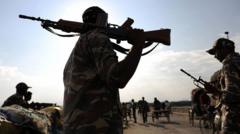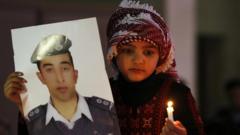The latest report reveals that the Sahel region now accounts for more than half of global terrorism-related fatalities, with insurgent groups gaining alarming influence and territory.
**Sahel: The New Terrorism Epicenter as Violence Surges**

**Sahel: The New Terrorism Epicenter as Violence Surges**
Explorative analysis of the dramatic rise of terrorism in Africa's Sahel region.
The Sahel region of Africa has emerged as the "epicenter of global terrorism," with new reports indicating that it now represents over 50% of global terrorism-related deaths. The Global Terrorism Index (GTI) reports that 3,885 out of a total of 7,555 terrorism fatalities worldwide occurred in this semi-arid region just south of the Sahara Desert. The overall global tally of terrorism deaths has decreased from its 2015 peak of 11,000; however, the figure within the Sahel has escalated nearly tenfold since 2019, signaling a troubling shift in the focus of extremist groups towards this area.
The GTI, published by the Institute for Economics and Peace, claims to define terrorism as acts of violence by non-state actors aimed at achieving political, religious, or social goals through intimidation and fear. Spanning across parts of ten countries—Burkina Faso, Mali, Niger, Cameroon, Guinea, The Gambia, Senegal, Nigeria, Chad, and Mauritania—the Sahel is characterized by some of the highest birth rates in the world, with a significant youth demographic.
In contrast to the rising prevalence of lone-actor terrorism seen in the West, the Sahel has observed rapid growth in militant jihadist groups, particularly the Islamic State affiliate in the Sahel and Jama'at Nusrat al-Islam wal Muslimeen (JNIM), which is linked to al-Qaeda. Security experts highlight that these groups strive to implement new legal systems based on Sharia law, competing for land and influence in the region.
The situation has drastically worsened, particularly since the military coups in Mali and Burkina Faso in recent years. The GTI report indicates that IS-Sahel has doubled its territorial control since these coups, mostly expanding toward its eastern borders with Niger and Burkina Faso. Both jihadist factions are reported to have significantly increased their recruitment efforts, with child soldiers being among their fighters.
The prevailing political instability, coupled with weak governance, has created a fertile ground for terrorism, as the GTI emphasizes that conflict is the leading driver of such acts. Dubbed Africa's "coup belt," the Sahel has seen six successful coups since 2020, with the nations now governed by military juntas. Interestingly, despite the perception of military rule being a solution to combat insurgent threats, the report notes that insecurity appears to have intensified.
Economic activities linked to terror groups have also transformed in this dynamic landscape. Insurgent factions engage in various illegal operations, including kidnapping for ransom and drug trafficking, the latter representing financially lucrative opportunities. Some factions prefer to establish financial ties through taxation or security services, thereby integrating with local communities and amplifying their influence.
As regional governments have shifted their political alliances away from Western nations toward countries like China and Russia for military support, concerns are growing over the escalation of terrorism spilling into neighboring countries. Togo recently experienced its highest number of attacks, with fatalities increasing, pointing towards an imminent expansion of terrorist activities in the region.
In conclusion, the trends illustrated by the GTI report suggest that without effective governance and an international response to the emerging ties between various jihadist groups, the Sahel could continue to suffer from escalating violence and instability, impacting broader West Africa.
The GTI, published by the Institute for Economics and Peace, claims to define terrorism as acts of violence by non-state actors aimed at achieving political, religious, or social goals through intimidation and fear. Spanning across parts of ten countries—Burkina Faso, Mali, Niger, Cameroon, Guinea, The Gambia, Senegal, Nigeria, Chad, and Mauritania—the Sahel is characterized by some of the highest birth rates in the world, with a significant youth demographic.
In contrast to the rising prevalence of lone-actor terrorism seen in the West, the Sahel has observed rapid growth in militant jihadist groups, particularly the Islamic State affiliate in the Sahel and Jama'at Nusrat al-Islam wal Muslimeen (JNIM), which is linked to al-Qaeda. Security experts highlight that these groups strive to implement new legal systems based on Sharia law, competing for land and influence in the region.
The situation has drastically worsened, particularly since the military coups in Mali and Burkina Faso in recent years. The GTI report indicates that IS-Sahel has doubled its territorial control since these coups, mostly expanding toward its eastern borders with Niger and Burkina Faso. Both jihadist factions are reported to have significantly increased their recruitment efforts, with child soldiers being among their fighters.
The prevailing political instability, coupled with weak governance, has created a fertile ground for terrorism, as the GTI emphasizes that conflict is the leading driver of such acts. Dubbed Africa's "coup belt," the Sahel has seen six successful coups since 2020, with the nations now governed by military juntas. Interestingly, despite the perception of military rule being a solution to combat insurgent threats, the report notes that insecurity appears to have intensified.
Economic activities linked to terror groups have also transformed in this dynamic landscape. Insurgent factions engage in various illegal operations, including kidnapping for ransom and drug trafficking, the latter representing financially lucrative opportunities. Some factions prefer to establish financial ties through taxation or security services, thereby integrating with local communities and amplifying their influence.
As regional governments have shifted their political alliances away from Western nations toward countries like China and Russia for military support, concerns are growing over the escalation of terrorism spilling into neighboring countries. Togo recently experienced its highest number of attacks, with fatalities increasing, pointing towards an imminent expansion of terrorist activities in the region.
In conclusion, the trends illustrated by the GTI report suggest that without effective governance and an international response to the emerging ties between various jihadist groups, the Sahel could continue to suffer from escalating violence and instability, impacting broader West Africa.




















